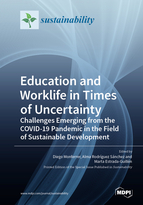Education and Worklife in Times of Uncertainty: Challenges Emerging from the COVID-19 Pandemic in the Field of Sustainable Development
A special issue of Sustainability (ISSN 2071-1050). This special issue belongs to the section "Sustainable Education and Approaches".
Deadline for manuscript submissions: closed (1 September 2022) | Viewed by 42769
Special Issue Editors
Interests: marketing management; services marketing; consumer behaviour; customer experience; relationship quality; higher education
Special Issues, Collections and Topics in MDPI journals
Interests: education for sustainable development; sustainability; corporate social responsibility; wellbeing at work; resilience; compassion
Interests: education for sustainable development; sustainability; innovative teaching and learning methods; higher education; emotional competencies; sustainable business
Special Issue Information
Dear Colleagues,
We are currently experiencing global emergency marked by a series of socio-environmental problems that seriously endanger the survival of the planet. A diverse range of authorities are now defending the urgent need to transition to a more sustainable society. These demands have turned sustainable development into a relevant topic in reseach, especially since the United Nations committed to achieving sustainable development goals by 2030. The United Nations Summit, held in New York in 2015, adopted the outcome document “Transforming our world: the 2030 Agenda for Sustainable Development” set out in 17 Sustainable Development Goals (SDG) and 169 targets to be implemented in the period 2016–2030. These 17 interrelated goals are designed to tackle a wide range of social, economic and environmental challenges. However, these goals will not be achieved without fundamental transformations in citizens’ actions and behaviours, which are heavily dependent on the role education plays in this process. Accordingly, target 4.7 of SDG 4 (Quality Education) refers to the need to “ensure that all learners acquire the knowledge and skills needed to promote sustainable development.” SDG 4 places human beings at the center of sustainable development, and emotional learning is a priority target. The question is stated as follows: is this objective being met?
On 11 March 2020, the World Health Organisation (WHO) declared novel coronavirus (SARS-CoV-2) an unprecedented global pandemic. Nearly every country across the globe is struggling to reduce the spread of the COVID-19 virus and to limit its health, societal and economic consequences. The full impact on community, work, family and its intersections is not yet clear (Fisher et al., 2020). As a response to that, with almost immediate effect, students, teachers and workers in general and across the globe were thrown into a new scenario of online work and education. In the midst of this emotional climate laden with fear, uncertainty, sadness and anxiety, millions of students all over the world were confined to their homes and the entire educational community (including families) had to adapt to a distance education model. The same occur with workers of different disciplines; they have to balance work and life (including education of their kids) in the same place. Therefore, homes suddenly became schools, universities and workplaces all at the same time. With this dramatic turn of events, the health crisis threw a spotlight on the shortcomings of face-to-face education and working systems that did not provide sufficient resources or training—neither emotional nor technological—for teachers, parents and workers in coping with the situation they were facing. In the absence of a defined model, for instance, teachers had to adapt educational content in record time, using tools to communicate with students or carrying out online assignments that, in most cases, they had never used before. On the other hand, parents had to learn new strategies to act as mediator between teachers and students. At the same time, some parents/workers also need to adapt their work schedule and goals to meet the challenges of their work and family needs. These challenges were further compounded by the digital divide: Many households did not have—and still lack—internet access or have just one computer for the entire family or perhaps have unsuitable computer systems. This sudden enforced shift to mass online education—defined as emergency remote teaching—has brought to the surface a series of contradictions in education systems; the most obvious is obesrved in social environments at high risk of social exclusion and in poorer countries and confirms the social divide that stands in the way of what was already a complicated digital transformation of education. Furthermore, this global crisis has also exposed the methods we apply in educatation and work, calling into question the use and application of new ways of thinking and acting, revealing the need for educational philosophies and methodologies focused on principles of social formation that help to build sustainable societies, to educate citizens to face the challenges of our current and future environment and to recognise the hurdles we face and react accordingly. In general, teachers, parents and workers in particular must not only analyse, debate and reflect on the limitations of the education system but also the opportunities that our contemporary history is experiencing. COVID-19 is simply the tip of an iceberg that exposes a society with complex problems. The pandemic, far from an exclusively a medical-health phenomenon, has emerged as a reality with a huge economic, social, political and, needless to say, educational impact. New alternatives and methods of thinking and acting are, therefore, called for. The prevailing worldview in education and also working life in general must be reinterpreted; we must configure a sustainable system, based on solidarity, for future generations and develop the capacity to generate new methods of collaborating that help to preserve life in the future by cultivating critical thought and proposing alternatives.
Against this backdrop, this Special Issue focuses on the study, evaluation and analysis of the opportunities the pandemic offers in three related aspects: first, for building an education for sustainable development. Second, for creating decent working conditions. Finally, to enhance health and well being both at the workplace and at home. Therefore, this Special Issue is framed with respect to the United Nations Sustainable Development Goals (SDG). Hence, the three main topics of the Special Issue cover the following SDG: objective number 3—Health and well being; objective number 4—Quality education; and objective 8—Decent work. Authors from a range of disciplines, such as education, psychology, management, social sciences and other areas related to sustainable development, are invited to submit their papers. Papers are aimed to address the challenges of studying, working and living in times of uncertainty in order to build sustainable development in those areas. Theoretical and applied research articles are welcome. Submissions for the Special Issue could relate, but are not limited, to the following topics:
- Teacher training and education for sustainable development;
- Environmental education;
- Teacher and students competencies for sustainability;
- Healthy working conditions;
- Online teaching and working in the pandemic;
- Work–family balance;
- Impact of COVID-19 on education and working conditions;
- Future trends in sustainability education;
- Future trends for sustainable work;
- Sustainable Development Goals (SDG).
References:
Fisher, J., Languilaire, J. C., Lawthom, R., Nieuwenhuis, R., Petts, R. J., Runswick-Cole, K., & Yerkes, M. A. (2020). Community, work, and family in times of COVID-19. Community, Work & Family, 23(3), 247-252.
Prof. Dr. Diego Monferrer
Dr. Alma Rodríguez Sánchez
Dr. Marta Estrada-Guillén
Guest Editors
Manuscript Submission Information
Manuscripts should be submitted online at www.mdpi.com by registering and logging in to this website. Once you are registered, click here to go to the submission form. Manuscripts can be submitted until the deadline. All submissions that pass pre-check are peer-reviewed. Accepted papers will be published continuously in the journal (as soon as accepted) and will be listed together on the special issue website. Research articles, review articles as well as short communications are invited. For planned papers, a title and short abstract (about 100 words) can be sent to the Editorial Office for announcement on this website.
Submitted manuscripts should not have been published previously, nor be under consideration for publication elsewhere (except conference proceedings papers). All manuscripts are thoroughly refereed through a single-blind peer-review process. A guide for authors and other relevant information for submission of manuscripts is available on the Instructions for Authors page. Sustainability is an international peer-reviewed open access semimonthly journal published by MDPI.
Please visit the Instructions for Authors page before submitting a manuscript. The Article Processing Charge (APC) for publication in this open access journal is 2400 CHF (Swiss Francs). Submitted papers should be well formatted and use good English. Authors may use MDPI's English editing service prior to publication or during author revisions.
Keywords
- teacher training and education for sustainable development
- environmental education
- teacher and students competencies for sustainability
- healthy working conditions
- on-line teaching and working in the pandemic
- work-family balance
- impact of COVID-19 on education and working conditions
- future trends in sustainability education
- future trends for sustainable work
- Sustainable Development Goals (SDG)








